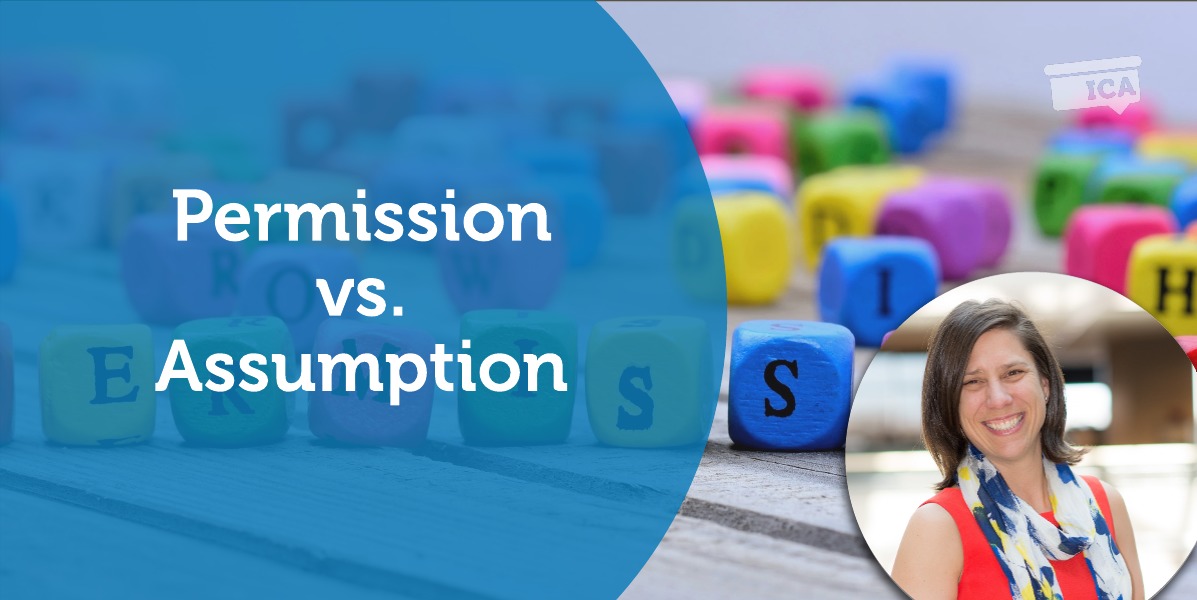 A Coaching Power Tool Created by Pascale Gonthier
A Coaching Power Tool Created by Pascale Gonthier
(Career Coach, CANADA)
We are bound by our assumptions and set free by our permissions.
Assumptions
We make decisions every day based, in part, on our assumptions. We leverage from our collection of assumptions to filter our choices and decide on a course of action, or inaction. Our brain has the capacity for rapidly sorting information largely unconsciously. Ronal Epstein wrote, “we are often unaware of exactly which memories, perceptions and assumptions affect our actions and our judgment”(Epstein, 2008).
Assumptions can serve us well, for example, they keep us safe, assess risks, mitigate challenges, and offer some predictability. We use assumptions to protect us from pain and guide us to pleasure, however, left unrevised, assumptions can become outdated resulting in auto-defaulting behaviors that can limit personal growth. The assumption is defined as a thing that is accepted as true, or as certain to happen, without a proof (https://www.vocabulary.com, 2020).
Permissions
Permission, however, provides the client with the encouragement to create a space for contemplation. The origin of permission comes from the Latin wordpermittere which means to allow to go or pass-through (https://www.vocabulary.com, 2020). When we let go of what we think will happen, we give ourselves permission to see what happens—and that openness and self-trust can unlock so many doors. (Beau, 2019).
The ability to see past our assumptions, leave the safety of the certainties behind, and being willing to risk feeling like an imposter is very difficult, and often a scary proposition. Permitting ourselves to feel, want, desire or risk can bean elusive exercise crippling our clients with fear. Yet, there is power in the act of permitting yourself to do something. Brenee Brown explains that permissions can be a reminder of how we want to feel or act – they are guidelines, not rules. (Brown, 2019). Permission can simply be to allow yourself to feel scared or uncomfortable, or to acknowledge that you will need time and self-care while you work through your change.
Using a permission-based approach will lead your client toward growth, it provides them with the awareness required to validate or disconfirm their assumptions rather than remain in auto-pilot decision making. There is a direct link between our unconscious thinking and our actions and behavior (MindTool, 2019), therefore by providing the client space for contemplation, they can uncover self-assumptions and actively decide what assumptions are true and which no longer serve them.
Coaching Application
To apply a permission-based power tool, there are a few helpful techniques.
Reflections, observations, visualization, and permission statements are just a few that can help activate the clients thinking and therefore offer them the space to validate or disconfirm their assumption(s).
- Observe how your client gives permission or encouragement to others.
People are more comfortable and willing to permit someone else. It’s easier to encourage others to ‘go for it’, then to apply that same outlook onto themselves. These questions aim at challenging the client to discern between what is or isn’t possible if they weren’t limited by their assumptions.
Suggested questions
- Reflect observation to your client when they use words the infer an assumption.
A client’s words can be a clue to assumption-based-behaviors, for example:
Suggested reflection questions
- Visualization
The use of a visualization exercise provides the client the permission to think and feel with freedom. Imagining an alternative option outside of the client’s current framework of assumptions can open new possibilities.
Suggested visualization exercises
- Incorporatepermissionstatements into their action plan.
When supporting a client with their action plan, it can be encouraging to have them permit themselves statements to help them get started to see what might be possible or what is holding them back.
Suggested questions
Self Application
As a coach, our assumptions about our own behavior must be contemplated regularly. We might select questions for our clients that are derived from our own unconscious bias.
Unconscious bias (or implicit bias) is often defined as prejudice or unsupported judgments in favor of or against one thing, person, or group as compared to another, in a way that is usually considered unfair. Many researchers suggest that unconscious bias occurs automatically as the brain makes quick judgments based on past experiences and background. (Equity, Diversity and Inclusion, 2020)
Therefore, blind to our assumptions, coaches can provide themselves the permission to accept that many aspects of their competence, effectiveness, and professionalism require some strategies to self-mitigate and self-monitor. Reflection is promoted as one way of gaining access to assumptions and permissions that often escape our awareness, and thus may place the coach in a better position to change them.
Coaches should include self-monitoring, and coaching supervision into their professional practice to build a habit that promotes flexibility and awareness of their assumptions into their practice.
References
Beau, A. (2019, June 26). Theshineapp.com. Retrieved from https://advice.theshineapp.com/articles/a-beginners-guide-to-giving-yourself-permission/
Brown, B. (2019). Daring Greatly. In B. Brown, Daring Greatly (pp. 53-54). New York: Gotham Books.
Dictionnary, W. (2020, 12 20). https://www.merriam-webster.com/. Retrieved from https://www.merriam-webster.com/: https://www.merriam-webster.com/dictionary/assumption
Epstein, R. M. (2008). Reflection, perception, and the acquisition of wisdom. In Medical Education (pp. 1048-1050). Blackwell Publishing Ltd.
Equity, Diversity, and Inclusion. (2020, 08 28). Retrieved from Vanderbilt University: https://www.vanderbilt.edu/diversity/unconscious-bias/
https://www.vocabulary.com. (2020, 12 19). Retrieved from https://www.vocabulary.com: https://www.vocabulary.com/dictionary/permission
MindTool. (2019). Mind Tools: Essential skills for an excellent career. Retrieved from https://www.mindtools.com/pages/article/avoiding-unconscious-bias.htm: https://www.mindtools.com/pages/article/avoiding-unconscious-bias.htm